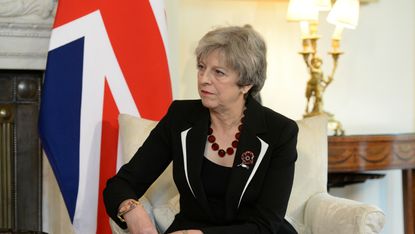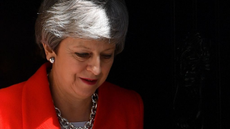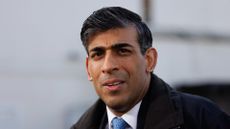How to find out your company’s gender pay gap
Theresa May decries ‘burning injustice’ as large firms face midnight deadline to reveal figures

Companies in the UK have until midnight tonight to comply with a new government mandate requiring employers with 250 or more staff to reveal any gender pay gap.
Tonight's deadline was set in a new law introduced last year to try to tackle wage differences between men and women carrying out the same job.
Writing in The Daily Telegraph today, the Prime Minister Theresa May calls the disparity a “burning injustice”, saying progress is “far too slow” and calling for an end to the gap “within a generation”.
Subscribe to The Week
Escape your echo chamber. Get the facts behind the news, plus analysis from multiple perspectives.

Sign up for The Week's Free Newsletters
From our morning news briefing to a weekly Good News Newsletter, get the best of The Week delivered directly to your inbox.
From our morning news briefing to a weekly Good News Newsletter, get the best of The Week delivered directly to your inbox.
“It is essential that we [tackle the gap],” she writes. “Most importantly, because equality for women is a right, and our whole society is the poorer as long as it remains unrealised.”
Most of the firms affected have already reported, says Politico’s Jack Blanchard, “with the median hourly shortfall for women standing at 18%”.
Of the around 9,000 firms with more than 250 staff required to report by midnight, the BBC notes 8,870 had done so as of 7.00am.
Of those that have already published data, “78% pay men more than women, while 13% pay women more”, it adds.
“A whiff of revolution is in the air,” says The Guardian, with employees joining together in an attempt to force their firms to take action.
On Monday, Walthamstow MP Stella Creasy will lead a group of politicians launching an online campaign called #PayMeToo, which aims to give working women advice on how to tackle any disparity.
It “encourages women to speak to their colleagues and bosses about the need to tackle gender pay gaps”, says The Independent, and “advises that they join a trade union and set up a women’s network at work”.
Those wishing to find out their own employer’s disclosure can visit the government’s pay gap website, which shows the average difference in earnings across each organisation.
Particularly telling is the section where companies reveal what percentage of the best and worst-paid members of staff are women. “This should give a clear insight into how committed the organisation is towards promoting women,” says The Guardian.
Create an account with the same email registered to your subscription to unlock access.
Sign up for Today's Best Articles in your inbox
A free daily email with the biggest news stories of the day – and the best features from TheWeek.com
-
 Will Aukus pact survive a second Trump presidency?
Will Aukus pact survive a second Trump presidency?Today's Big Question US, UK and Australia seek to expand 'game-changer' defence partnership ahead of Republican's possible return to White House
By Sorcha Bradley, The Week UK Published
-
 Farewell to Theresa May: a PM consumed by Brexit
Farewell to Theresa May: a PM consumed by BrexitTalking Point Maidenhead MP standing down at next general election
By The Week UK Published
-
 It's the economy, Sunak: has 'Rishession' halted Tory fightback?
It's the economy, Sunak: has 'Rishession' halted Tory fightback?Today's Big Question PM's pledge to deliver economic growth is 'in tatters' as stagnation and falling living standards threaten Tory election wipeout
By Harriet Marsden, The Week UK Published
-
 Why your local council may be going bust
Why your local council may be going bustThe Explainer Across England, local councils are suffering from grave financial problems
By The Week UK Published
-
 Rishi Sunak and the right-wing press: heading for divorce?
Rishi Sunak and the right-wing press: heading for divorce?Talking Point The Telegraph launches 'assault' on PM just as many Tory MPs are contemplating losing their seats
By Keumars Afifi-Sabet, The Week UK Published
-
 How would a second Trump presidency affect Britain?
How would a second Trump presidency affect Britain?Today's Big Question Re-election of Republican frontrunner could threaten UK security, warns former head of secret service
By Harriet Marsden, The Week UK Published
-
 'Rwanda plan is less a deterrent and more a bluff'
'Rwanda plan is less a deterrent and more a bluff'Instant Opinion Opinion, comment and editorials of the day
By The Week UK Published
-
 How the biggest election year in history might play out
How the biggest election year in history might play outThe Explainer Votes in world's biggest democracies, as well as its most 'despotic' and 'stressed' countries, face threats of violence and suppression
By Harriet Marsden, The Week UK Published


